The difference equation and initial conditions are

Mathematica (7 and 8) does not like solving it... both with and without initial conditions. The RSolve expressions are left unevaluated
In[1]:= RSolve[{f[m,n]==f[m,n-1]+f[m-1,n],f[0,n]==f[m,0]==1},f[m,n],{m,n}]
RSolve[{f[m,n]==f[m,n-1]+f[m-1,n]},f[m,n],{m,n}]
Out[1]= RSolve[{f[m,n]==f[-1+m,n]+f[m,-1+n],f[0,n]==f[m,0]==1},f[m,n],{m,n}]
Out[2]= RSolve[{f[m,n]==f[-1+m,n]+f[m,-1+n]},f[m,n],{m,n}]
I know that Mathematica uses generating functional methods (probably among other things) to solve such recurrences, but I don't know why it fails in such a simple case.
So let's do it by hand.
Let g(x,n) be the generating function for f(m,n)

Now examine the sum of f(m+1,n) x^m

Now solve the simple algebraic-difference equation:

Which can also be done with RSolve
In[3]:= RSolve[g[x,n]-x g[x,n]==g[x,n-1]&&g[x,0]==1/(1-x),g[x,n],n];
Simplify[%,Element[n,Integers]]
Out[4]= {{g[x,n]->(1-x)^(-1-n)}}
Now extract the coefficient of x^m:
In[5]:= SeriesCoefficient[(1 - x)^(-1 - n), {x, 0, m}]
Out[5]= Piecewise[{{(-1)^m*Binomial[-1 - n, m], m >= 0}}, 0]
The binomial is simplified using
In[6]:= FullSimplify[(-1)^m*Binomial[-n - 1, m] == Binomial[m + n, m], Element[{n,m}, Integers]&&m>0&&n>0 ]
Out[6]= True
So we finally get

This can be checked using symbolic and numeric means
In[7]:= ff[m_,n_]:=ff[m,n]=ff[m-1,n]+ff[m,n-1]
ff[0,_]:=1;ff[_,0]:=1
In[9]:= And@@Flatten[Table[ff[m,n]==Binomial[n+m,m],{n,0,20},{m,0,20}]]
Out[9]= True
In[10]:= {f[m,n]==f[m,n-1]+f[m-1,n],f[0,n]==f[m,0]==1}/.f->(Binomial[#1+#2,#1]&)//FullSimplify
Out[10]= {True,True}




